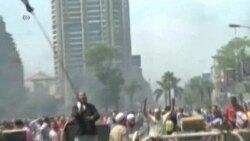WASHINGTON —
Middle East analysts say this week’s violence in Egypt, which killed hundreds of people, appears likely to continue and there is virtually no chance of reconciliation between the Egyptian military and the Muslim Brotherhood. They say ongoing clashes will challenge the nation’s military-backed government and have regional implications as well.
Clashes between security forces and Islamist supporters of ousted President Mohamed Morsi are going strong in Cairo and across Egypt.
Analysts say it now seems clear the Egyptian military has decided the Muslim Brotherhood represents such a threat to the country there is no chance for reconciliation between secular and Islamist forces.
Robert Satloff of the Washington Institute for Near East Policy said, “They believe that they have antithetical enemies, adversaries, that there is no room in the political system for the leadership of the Muslim Brotherhood."
Satloff said the Brotherhood has three options - go underground, try to reengage in politics or fight. He said if the violence continues, there will be more terrible bloodshed that will threaten the stability of Egypt.
“We have a test of wills right now. The military’s task is to vanquish the Brotherhood leadership quickly so that this doesn’t spiral out of control and make a truly Algeria or Syria-style civil war,” he said.
The crackdown on pro-Morsi demonstrators and the skyrocketing death toll have drawn global condemnation.
The United States stopped short of cutting off $1.5 billion in annual aid to Egypt, but has cancelled joint military exercises.
U.S. President Barack Obama said, “Going forward I have asked my national security team to assess the implications of the actions taken by the interim government and further steps that we may take as necessary with respect to the U.S.-Egyptian relationship.”
Hundreds of demonstrators were killed when security forces used snipers, bulldozers and tear gas to clear them from two camps in Cairo.
The crackdown sparked running battles in the capital and elsewhere.
Deadly force has been authorized to protect police and state institutions.
In addition to security concerns, analysts say the ruling generals will now face an array of problems.
Manal Omar at the U.S. Institute of Peace has just returned from Egypt. "The military will have challenges beyond how they handle the Muslim Brotherhood. They are going to have the same challenges that Morsi faced in terms of economic development, in terms of really being able to show the average Egyptian citizen change in their daily life.”
The chaos in Cairo comes at a time the Middle East is already deeply shaken by the civil war in Syria.
“There will be these two major domestic issues, the path in Egypt and the path in Syria, will for quite some time determine the shape of regional events and our own interests in the area,” said Satloff.
The international community has urged both sides in Egypt to show restraint and end the turmoil engulfing the nation.
Clashes between security forces and Islamist supporters of ousted President Mohamed Morsi are going strong in Cairo and across Egypt.
Analysts say it now seems clear the Egyptian military has decided the Muslim Brotherhood represents such a threat to the country there is no chance for reconciliation between secular and Islamist forces.
Robert Satloff of the Washington Institute for Near East Policy said, “They believe that they have antithetical enemies, adversaries, that there is no room in the political system for the leadership of the Muslim Brotherhood."
Satloff said the Brotherhood has three options - go underground, try to reengage in politics or fight. He said if the violence continues, there will be more terrible bloodshed that will threaten the stability of Egypt.
“We have a test of wills right now. The military’s task is to vanquish the Brotherhood leadership quickly so that this doesn’t spiral out of control and make a truly Algeria or Syria-style civil war,” he said.
The crackdown on pro-Morsi demonstrators and the skyrocketing death toll have drawn global condemnation.
The United States stopped short of cutting off $1.5 billion in annual aid to Egypt, but has cancelled joint military exercises.
U.S. President Barack Obama said, “Going forward I have asked my national security team to assess the implications of the actions taken by the interim government and further steps that we may take as necessary with respect to the U.S.-Egyptian relationship.”
Hundreds of demonstrators were killed when security forces used snipers, bulldozers and tear gas to clear them from two camps in Cairo.
The crackdown sparked running battles in the capital and elsewhere.
Deadly force has been authorized to protect police and state institutions.
In addition to security concerns, analysts say the ruling generals will now face an array of problems.
Manal Omar at the U.S. Institute of Peace has just returned from Egypt. "The military will have challenges beyond how they handle the Muslim Brotherhood. They are going to have the same challenges that Morsi faced in terms of economic development, in terms of really being able to show the average Egyptian citizen change in their daily life.”
The chaos in Cairo comes at a time the Middle East is already deeply shaken by the civil war in Syria.
“There will be these two major domestic issues, the path in Egypt and the path in Syria, will for quite some time determine the shape of regional events and our own interests in the area,” said Satloff.
The international community has urged both sides in Egypt to show restraint and end the turmoil engulfing the nation.





